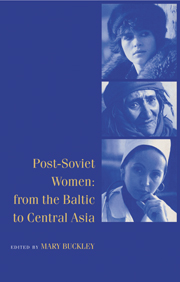Book contents
- Frontmatter
- Contents
- List of figures
- List of tables
- Notes on contributors
- Note on transliteration
- Map
- INTRODUCTION
- PART I WOMEN IN THE RUSSIAN FEDERATION
- 2 Do Russian women want to work?
- 3 Rural women and the impact of economic change
- 4 Women and the culture of entrepreneurship
- 5 Images of an ideal woman: perceptions of Russian womanhood through the media, education and women's own eyes
- 6 ‘She was asking for it’: rape and domestic violence against women
- 7 ‘For the sake of the children’: gender and migration in the former Soviet Union
- 8 When the fighting is over: the soldiers' mothers and the Afghan madonnas
- 9 Adaptation of the Soviet Women's Committee: deputies' voices from ‘Women of Russia’
- 10 Women's groups in Russia
- PART II WOMEN OUTSIDE RUSSIA IN NEWLY INDEPENDENT STATES
- Index
6 - ‘She was asking for it’: rape and domestic violence against women
Published online by Cambridge University Press: 18 December 2009
- Frontmatter
- Contents
- List of figures
- List of tables
- Notes on contributors
- Note on transliteration
- Map
- INTRODUCTION
- PART I WOMEN IN THE RUSSIAN FEDERATION
- 2 Do Russian women want to work?
- 3 Rural women and the impact of economic change
- 4 Women and the culture of entrepreneurship
- 5 Images of an ideal woman: perceptions of Russian womanhood through the media, education and women's own eyes
- 6 ‘She was asking for it’: rape and domestic violence against women
- 7 ‘For the sake of the children’: gender and migration in the former Soviet Union
- 8 When the fighting is over: the soldiers' mothers and the Afghan madonnas
- 9 Adaptation of the Soviet Women's Committee: deputies' voices from ‘Women of Russia’
- 10 Women's groups in Russia
- PART II WOMEN OUTSIDE RUSSIA IN NEWLY INDEPENDENT STATES
- Index
Summary
This chapter is concerned primarily with Russian attitudes and responses to two forms of male violence against women: rape and wife battery. 14,400 cases of rape were recorded in the Russian Federation in the year 1993, a figure which is thought to represent, at most, 10 per cent of the total. In the same year 14,500 women were reported to have been murdered by their husbands (or male partners). This constituted more than half of the total number of recorded murders in the country, and far exceeded the widely publicised mafia killings. Shrouded in silence in the Soviet Union of the past, rape and domestic violence are now receiving considerable interest on the part of journalists and academics. Yet while authors applaud the new openness in Russia which allows them to tackle such formerly taboo subjects, they are doing nothing to challenge past orthodoxies. Instead, their writings reproduce old myths about rape and male violence against women which have been challenged by Western research of the past two decades. Rape and other forms of male violence against women are said to have different motivations; lust in the former and anger in the latter. Both are, to a large extent, victim precipitated: women are partly responsible for the violence committed against them because of their own behaviour. Furthermore, women are natural masochists, which means they enjoy being overpowered and treated roughly. Proposals for countering rape and male violence against women centre on the resurrection of a rigid differentiation of gender roles, which Western feminist theorists working in this field see as a cause of, rather than a solution to, the problem.
- Type
- Chapter
- Information
- Post-Soviet WomenFrom the Baltic to Central Asia, pp. 99 - 118Publisher: Cambridge University PressPrint publication year: 1997
- 30
- Cited by



